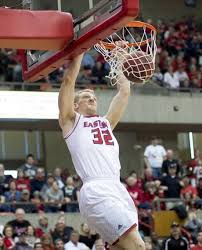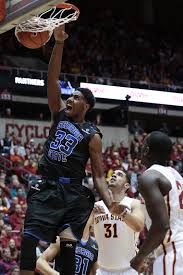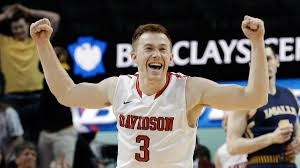For the rest of Jon’s interviews – CLICK HERE
Players and head coaches are very important to a team’s success, but do not sleep on those invaluable assistant coaches as well. Eastern Washington made the NCAA tourney last year for the 1st time in more than a decade, and a big reason they have improved from 10 wins in 2013 to 26 wins last year is assistant coach Shantay Legans. If his name rings a bell, that is because he played at Cal and Fresno State, where he was 1 of the top PGs in both the Pac-10 and WAC. HoospHD’s Jon Teitel got to chat with Coach Legans about playing pro basketball and helping to turn Tyler Harvey from a walk-on into the best scorer in the country.
In the 2001 NCAA tourney as a player at Cal you scored a team-high 15 PTS in a loss to Fresno State: could you have ever imagined at the time that you would end up transferring to Fresno State for your senior year? I could not have imagined playing for the team that put us out of the tourney: it was a very hard loss at the time. However, when my “big brother” (from the Big Brother Big Sister program) got the job at Fresno State, it was a dream come true to play for him.
In 2004 you led the WAC with 5.6 APG and finished in the top-10 in the conference in PPG/3P%/FT%: what is the key to being a good PG? Having an understanding of what your coaches want from both you and the team. Once you understand that, then you have to be able get yourself and the guys to execute the plan. You need to be a coach on the floor and also put in a lot of work!
You later played pro basketball in Europe: what is the biggest difference between college basketball and pro basketball? Having a 24-second shot clock and not being able to understand all of your teammates (or even your coach) at times!
Several years ago you became an assistant at Eastern Washington: why did you take the job, and what do you hope to do in the future? I took this job because it was a dream of mine to become a coach. I love the game of basketball and it has opened so many doors for me. Being able to help kids who get to live their dreams of playing college basketball and earning a degree is very meaningful to me. One of my goals for the future is to become a head coach.
In the 2015 Big Sky tourney title game you had a 4-PT win over Montana: what did it mean to you to win the conference title, and what was the reaction like when you got back to campus? It was a great feeling: being able to sit back and look at all the hard work that we put into the season and say we are Big Sky champs is something special. Our Eastern Washington community is great and they gave the guys a championship welcome!
In the 2015 NCAA tourney you had a 10-PT loss to Georgetown: what did your team learn from that game that you think can help you this year? The coaches/players all had the experience of playing in our sport’s preeminent tournament, which is the goal of every team in D-1. The team learned that we can compete with the best, and by playing our best we can make our fans and ourselves proud. Most importantly we learned not to be nervous: if we just play our game then we will be winners.
You helped Tyler Harvey develop from a walk-on to the nation’s leading scorer to an NBA draft pick: how did you do it, and how are you going to try to replace all of his offense? It was a lot of fun: Tyler works extremely hard and makes the job fun! He is a kid who loved to work hard every day and did not mind working on the things that he needed to get better at. It will be a team effort to replace his 23 PPG but our team will be up for the challenge. We have some dynamic scorers and 1 of the best offensive minds in college basketball at the helm.
In April PG Austin McBroom announced that he was transferring from St. Louis: what is the key to integrating players from other schools into your own high-scoring offense? It has to be the right fit: he has to be our type of player and have a very high character. One of the most important things is that our current players have to like the kid who will be coming in. Austin fit right in so it was a no-brainer.
Your non-conference schedule includes road games against Mississippi State/Davidson/Pitt: which of these games do you feel will present your biggest test? It is hard to pick 1 since all of those teams are well-coached and very talented. I am excited that our program gets to go out and challenge some of the top teams in the country.
What are your goals for the upcoming season, and what are your expectations for the upcoming season? Our team goal has always been the same even since Coach Hayford took the job: win the Big Sky and go to the NCAA tourney. During that process we also want to create a great environment for our guys to flourish as young men. I expect that our team will give it all they have this year and make another great run!








